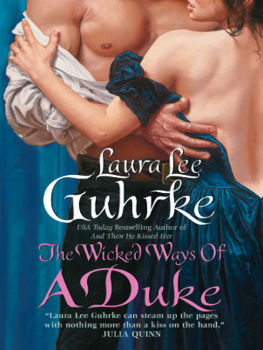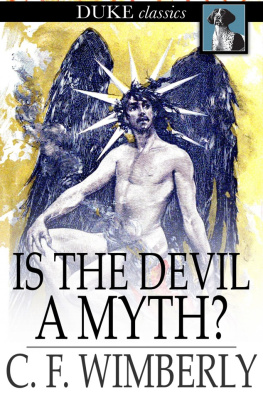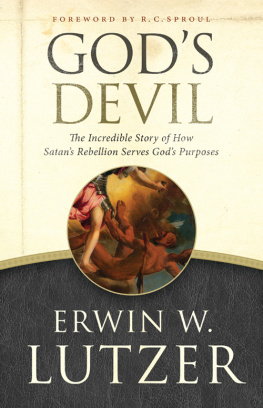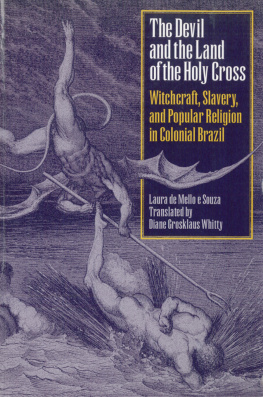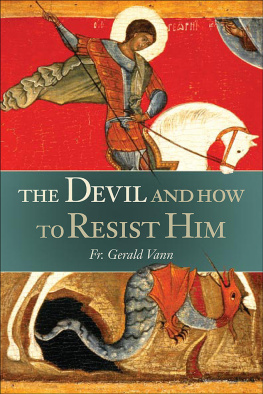Laura Lee Guhrke
Scandal
of the Year
ABANDONED AT THE ALTAR

For the talented fellow authors who helped me so much
during the writing of this book:
Elizabeth Boyle, Gayle Callen, and Kathryn Smith.
I cant tell you how much your friendship,
support, and enthusiasm mean to me.
Thank you.
Out of the night that covers me,
Black as the Pit from pole to pole,
I thank whatever gods may be
For my unconquerable soul.
In the fell clutch of circumstance
I have not winced nor cried aloud.
Under the bludgeonings of chance
My head is bloody, but unbowed.
Beyond this place of wrath and tears
Looms but the Horror of the shade,
And yet the menace of the years
Finds, and shall find, me unafraid.
It matters not how strait the gate,
How charged with punishments the scroll,
I am the master of my fate:
I am the captain of my soul.
Invictus
William Ernest Henley, 1875
Contents
F rom the London society newspaper Talk of the Town , Friday, October 9, 1903:
YARDLEY DIVORCE HEARING
CONVENES TODAY!
Will the baroness publicly admit to her adultery? Or will she deny it to save herself from further disgrace?
The London courtroom was packed to the rafters, and Julia could feel the avid stares of the curious crowd boring into her back as she walked up the aisle to stand before the president of the divorce court.
Plenty of reporters were there, of course, pencils in hand, scribbling down the lurid details that would appear in the evening papers.
Yardley was there, too, arms folded, remote and inhumanjust as usual, in other words. Julia did not acknowledge his presence. Without turning her head, she spared him only the briefest sideways glance as she passed the table where he sat.
She knew several members of her family and some of her friends were present as well, but she did not look back to find their faces in the crowd. She couldnt, not now, not yet, not until it was over.
When Sir Birrell cast his stern, reproving eye upon her, Julia felt no pang of conscience for what she had done or what she was about to do. When he asked her if the accusation of her husband was true, she took a deep breath and lifted her chin to an angle she hoped was as unrepentant as she felt. Casting aside the fear that had haunted her for the twelve long, loveless years of her marriage, she turned to look into Yardleys cold black eyes.
Yes, she said, her voice ringing out like a bell of liberty, filled with such adamant conviction that she almost believed herself. On the afternoon of August 21, 1903, I had intimate relations of a sexual nature with Aidan Carr, the Duke of Trathen.
The court erupted. Sir Birrell pounded his gavel, demanding order, and when it had been regained, he declared Yardleys petition granted. A decree of divorce would be issued immediately and would be declared final in six months. Julias knees sagged beneath her in relief, and the desperation and despair that had haunted her since the day of her wedding began to ease away. A slave when she came into the court, she turned to leave it knowing that at last she would be free.
It was then that she saw Aidan at the back of the courtroom, standing by the door. His presence surprised her, for as named co-respondent, he had already submitted a written statement and had sworn to its validity before this court a short while ago. He had no need to linger here, and by remaining, he was only giving the ravenous scandal sheets more meat to savor.
As she looked at him, her mind flashed back to the first time shed ever seen him, standing by that brook in Dorset twelve years earlier, and though it seemed a lifetime ago, he hadnt changed much during the intervening years. He was as gravely handsome at twenty-nine as hed been at seventeen.
She could read nothing in his expression as he studied her. Several tendrils of his unruly brown hair curled over his straight brown brows, and below them, his hazel eyes were steady and unblinking as they looked into hers. His stare was hard, searching, but with no glimmer of doubt. As she approached where he stood by the door, his chin went up a notch, and the lines of Henleys Invictus echoed through her mind.
It hurt to look at him now, in the aftermath of what she had wrought. Hed been publicly humiliated, his reputation stained. He would not be permanently damaged, but Julia knew that wasnt the point. She had done far worse than stain his reputation. She had compromised his honor and stolen his self-respect. For the first time, guilt pressed upon her, a weight against her chest and a shadow on her soul, but she could not find it in her heart to regret what she had done.
As she drew closer, his lips tightened, but he spoke no word to her. He did not turn his head to watch her as she passed. He stood as a soldier stands to post, without moving, his wide shoulders stiff and proud, reminding her that although she was now free, she was not the only one who had paid the price for her freedom.
London
May 1904
T he Duke of Trathen needed to find a wife. The problem was that when it came to picking the right woman for the job, His Grace was having a serious run of bad luck.
One might think that for a man of his station, choosing a bride would be a relatively straightforward business. Dukes were a rare commodity, highly sought in the marriage mart, so it wasnt as if he lacked a substantial slate of candidates from which to choose. Nor were dukes hampered by anything as inconvenient as love. Alliance was a perfectly acceptable reason for matrimony among those of the aristocracy, and Aidan Thomas Carr was a man who could trace his aristocratic lineage to the days of Queen Elizabeth.
The eleventh Duke of Trathen, Aidan was in possession of half a dozen lesser titles as well. He was also one of the wealthiest men in Britain, with substantial lands and investments. He had an astute head for business, had a keen interest in politics, and was considered by many among the fair sex to be quite a handsome fellow.
This stellar rsum notwithstanding, the Duke of Trathen was a jilted man, having been abandoned at the altar not once, but twice. He was a bit skittish about making a third attempt, but every duke had a duty to his family and his heritage to marry well, produce sons, and pass everything on to the next generation, and Aidan was a man who would never ignore his duty.
When the time arrived for the Marquess of Kaynes annual May Day Ball, the most prominent charity event of the London season, the Duke of Trathen was among the attendees. He was not particularly fond of dancing, he hated these crowded charity affairs, and given the endless gossip about him these days, he would have preferred to spend the spring as he had spent the winterat his favorite estate in Cornwallbut he could not afford that luxury. He was now thirty years old, time was going by, and a man could meet many potential marriage partners at a charity ball.
When hed begun his search for a duchess three years earlier, hed never dreamed it would be this difficult. He had decided, quite logically, that twenty-seven was a good age at which to wed, and he had set about finding his duchess. Four months later, hed met Lady Beatrix Danbury, a girl who was not only beautiful, with honey-blond hair and big, soft brown eyes, but also charming and intelligent. The daughter of an earl, shed been groomed all her life for the duties of a high-ranking peeress. Aidan had thought their interests coincided, and their affection mutual. Not an overmastering passion, perhaps, but he had never been the sort of man to be carried away by passion, a fact that had seemed acceptable to Beatrix. By Christmas of that year, they had become engaged, but less than two months before the wedding, shed thrown him over for her childhood sweetheart, the Duke of Sunderland.


